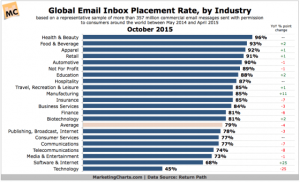If your business has never had a company blog, started one up and then took a lengthy hiatus, or posted content so frequently that it caused you to burn out, it’s time to take a moment to reexamine your place as a blogger. You might be ready to get back into the saddle, but want to go about it differently than before. This time around, you’re ready to start blogging with a strategy — and these are the key questions to ask before you get started (again).
1. Revamp your brand’s content strategy.
As a blogger, you don’t necessarily need to write articles to get your message across anymore. You can vlog, create a podcast, or make your own in-house infographic to share based on interesting internal data. Put together a strategy for the kind of content you will post on your blog and determine how that information will be shared via social and live on after it has been created.
2. Measure the success of your blogging efforts.
Metrics are a huge factor in blogging. If you don’t have a thorough understanding of the kind of traffic that certain types of content bring in or what posts your audience connects to the most, it will be too hard to tell if your blog is successful.
Two key metrics for measuring success are engagement and distribution. Engagement generally includes vanity metrics like likes, comments, and shares along with the mentions your blog gets elsewhere online, typically through backlinks. Distribution is where your audience is seeing your content and how well click-through rates (CTR) are performing. You’ll want to pay attention to both of these metrics in order to better understand who is liking your content and where the audience is coming from.
3. Consider bringing on guest bloggers or posting sponsored content.
Depending on the nature of your business, you might find it’s effective to bring on outside voices as guest bloggers or to post content that is part of a sponsored partnership.
A guest writer or influencer who has years of expertise within the same field as you could be a great asset to boosting your readership and site traffic, giving you the chance to build a rapport together. Sponsored content, on the other hand, is content that might resemble material you would post but is actually meant to promote the advertiser’s products or services. In either case, you’ll need to work out the details for how the contributed content can provide value to your audience and still remain reflective of your brand’s voice.
4. Get feedback from your readers.
What kind of content do your readers want, or expect, from your blog? Whether you’ve been away from blogging for a bit or are hitting refresh entirely, ask your existing readers what they want to see you post. You can survey them through email newsletter templates or post polls via social media platforms.
5. Blog about what you know — and know all you can know about that topic.
In a sea of blogs online, the best way to stand out is to be yourself and cement yourself as an expert within your given field. Use your blog to push the envelope as much as possible with researched, action-driven content. Be clear, concise, and add unique twists to your articles! This will keep your readers coming back to your blog and better position you as an expert, while giving you the drive to keep blogging because it’s on subjects you know and understand best.
Digital & Social Articles on Business 2 Community(53)





